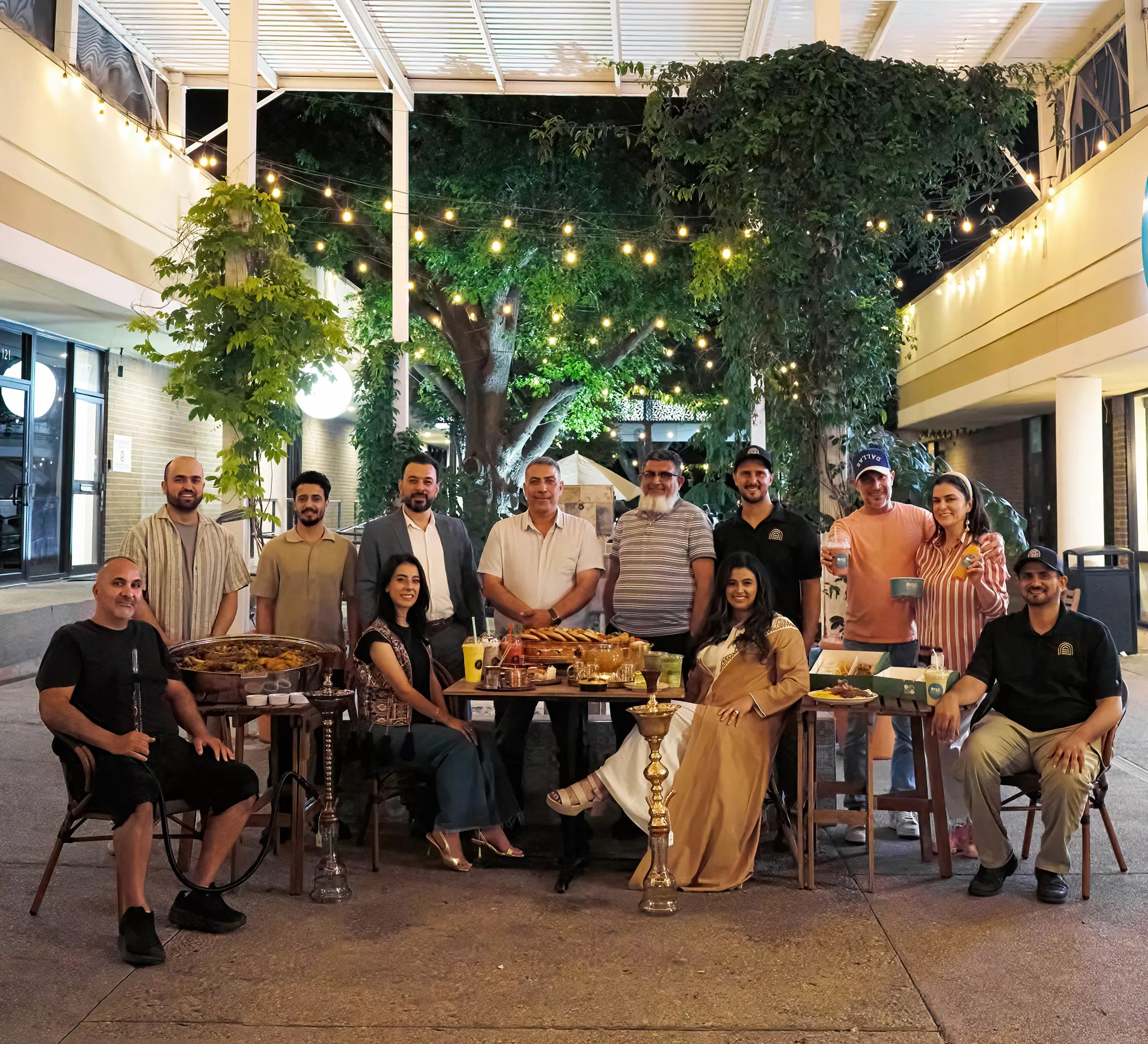
Alison McLean

Audio By Carbonatix
When you walk into the courtyard of the Arabian Village shopping center, the first thing you notice is the hum. It’s a warm wall of sound made up of clattering plates, a trickling fountain, and the playful clamoring of children mixed with laughter and conversing adults.
And then you notice the smell, hot tea steaming into the air, lamb and chicken fresh off the grill, pastries being bitten into and a potpourri of savory Middle Eastern spices underscoring it all.
Most nights, it’s hard to find a seat, inside or outside, at this vibrant hideaway. Nestled on a corner in Richardson between Greenville Avenue and Centennial Boulevard, the Arabian Village shopping center houses six Middle Eastern small businesses that stay open and busy well into the night.
Arwa Yemeni Coffee is at its nucleus, both physically and metaphorically. The popular coffee and tea outpost opened when the shopping center was desolate and became the catalyst for revitalizing the area and creating an organic cultural haven.
“You see a lot of Yemeni coffee shops in the area,” says Arwa owner Yazan Soofi. “But when we opened, we were the only ones.”
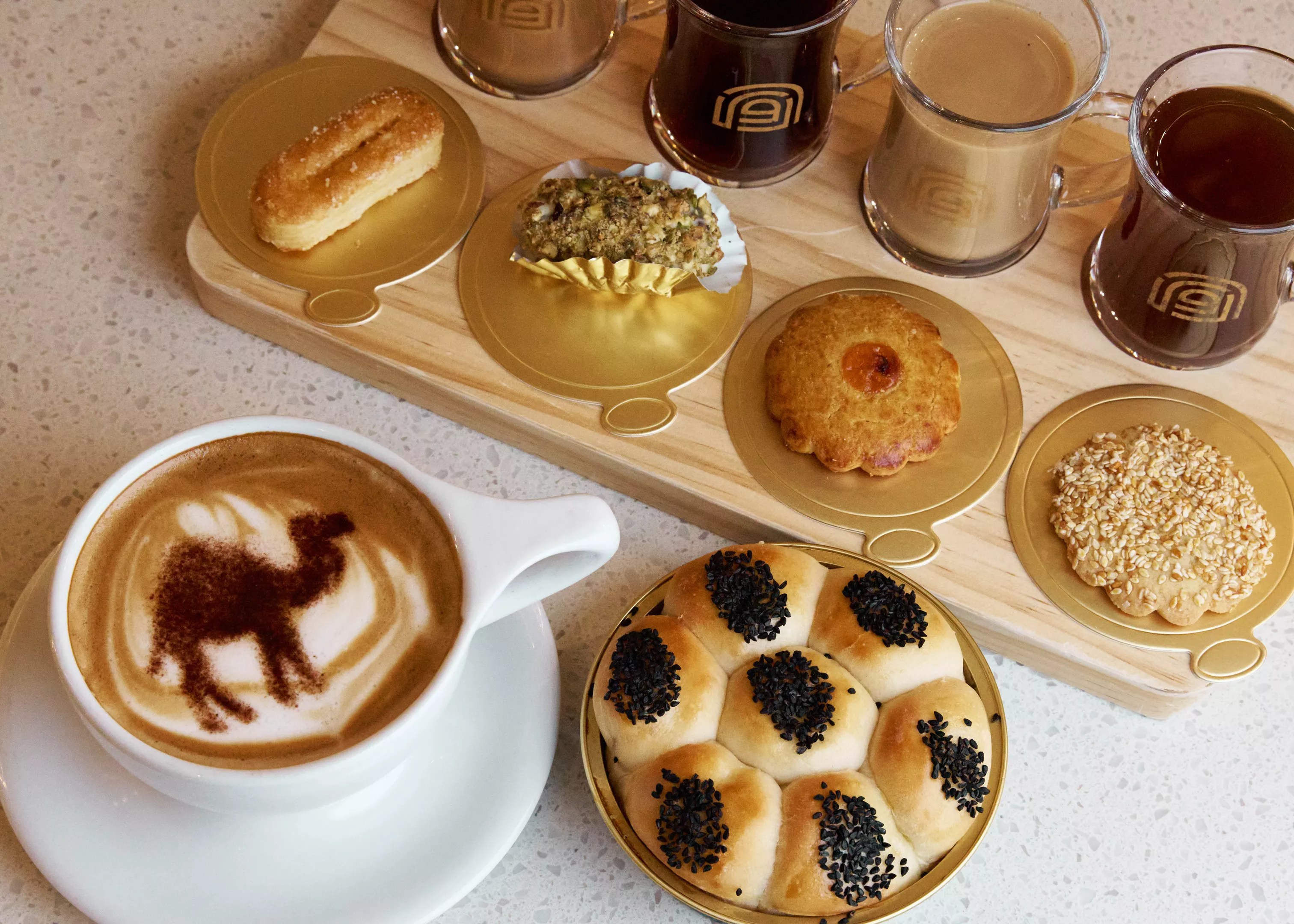
Arwa Yemeni Cafe coffee and pastry treats.
Alison McLean
He’s one of the shop’s four owners, along with his wife, Susan Shihab, his sister Nora, and her husband, Faris Almatrahi, who opened the shop in December 2022.
Ethnically, all four are Yemeni, although Shihab was born in the U.S. The shop’s name is a tribute to Queen Arwa, the region’s first Islamic queen, who ruled between the 11th and 12th centuries.
“We have your traditional coffee that you’ll find in any coffee shop,” Soofi says. “But then I also want you to experience some of Yemen. A huge thing about Yemen is that our hospitality is key. Your reputation in the community is how you welcome your guests.”
Big shareable pots, inviting couches and a bustling social environment are as emblematic of the shop as the uniquely crafted drinks.
Arwa’s signatures include the traditional Adeni tea, a perfected concoction of black tea, milk and spices named for Aden, a small port city in Yemen between the Red Sea and the Arabian Sea. The shop’s most popular drink is served in individual cups or a pot for four.
The traditional Jubani coffee is also a standout, a light black blend often subtly flavored with ginger, cinnamon and cardamom. The Mofawar is a similar Yemeni coffee blend mixed with cardamom and cream.
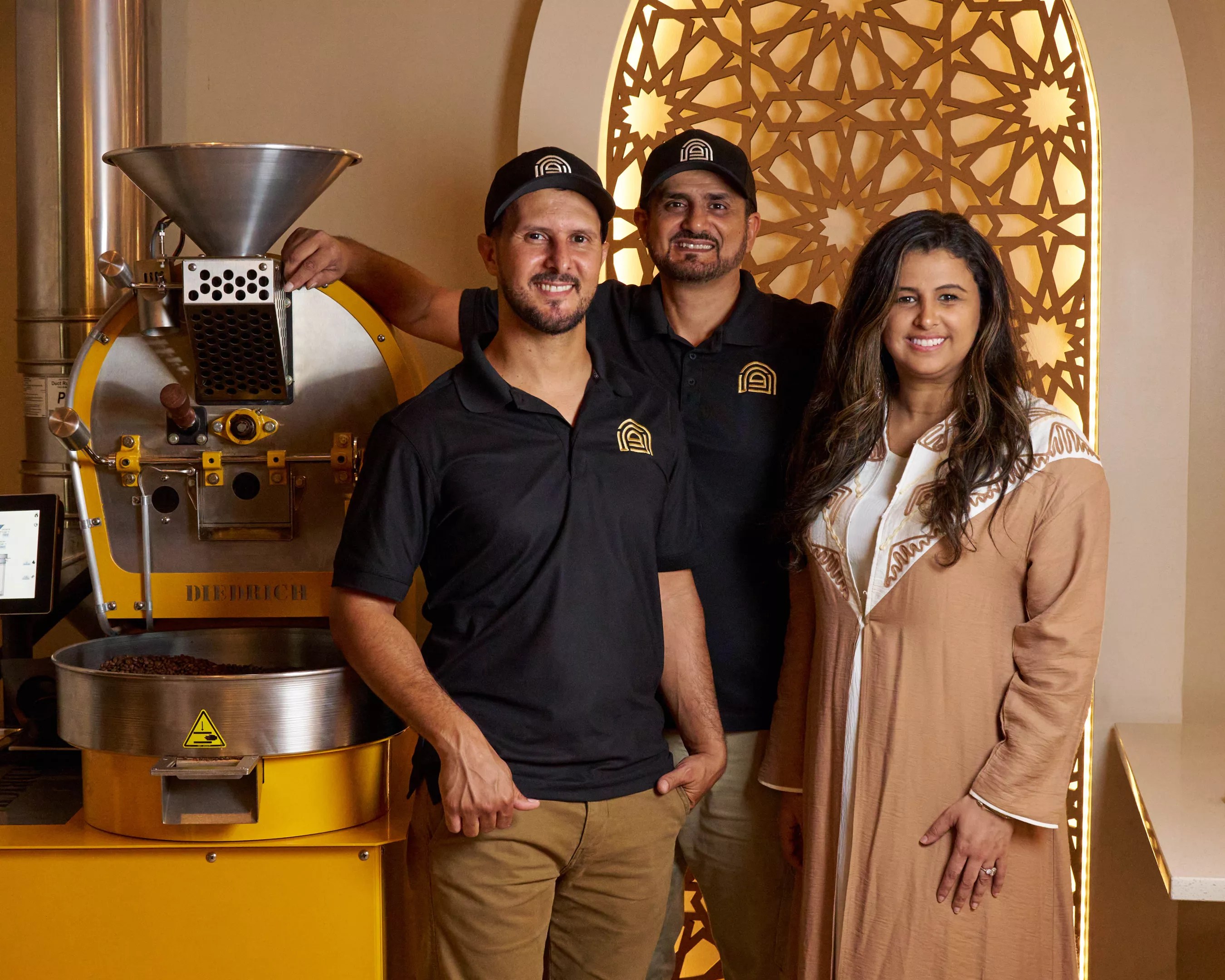
Yazan Soofi, Faris Almatrahi, Susan Shihab own and operate Arwa Yemeni Coffee in the Arabian Village.
Alison McLean
Keeping to tradition, whether in flavor or aesthetic, was a priority since the first time they opened Arwa’s doors. Part of this can be attributed to the palpable sense of national pride felt by Arwa’s owners, and a tribute to their family’s cultures. But another factor is unfortunate circumstance. In 2014, a widespread civil war broke out across the country that continues to rage on today, making travel dangerous and difficult.
All four owners took regular trips back to Yemen in the years before the war, but none have been back in over a decade.
“When we took on this project,” Almatrahi says, “it was driven by the fact that Yemen was war-torn and we were unable to visit. We tried to pull as many memories and as many elements as possible so that when we’re at this coffee shop, it’s bringing those memories back.”
In spring 2023, Arwa hosted a one-day cultural festival celebrating the country’s flavors and history. Camels were brought into the parking lot, and the owners wore traditional Yemeni clothing.
“It almost brought tears to my eyes,” Almatrahi says. “No matter how successful or how much we gain out of this, that was probably one of the best days that I’ve had. Just being able to dress in our cultural clothing, being able to bring that camel here, being able to bring that experience to people that have never experienced it in their entire life and seeing the joy that it brought.”
The festival took place when Arwa was still in its infancy. These days, it’s hard to find a seat inside at night.
Although Yemeni coffee remains a niche here, those who try it often leave obsessed. Speaking from experience, they tend to drag their friends and family along for an initiation visit. That word-of-mouth, combined with an exploding social media presence, catapulted Arwa to immediate success in Dallas.
“We expected some interest on the weekends,” Soofi says. “But we didn’t expect the lines to be forming out the door. It was all hands on deck.”
Arwa was established as a destination spot on many fronts within a year of opening. To coffee aficionados, it offered flavors that were previously unseen in Dallas. Middle Eastern customers responded heavily to those flavors, populating the shop, especially in its early days. For non-drinkers or workaholics looking for a place to be productive after dark, Arwa remained open until 11 p.m. on weeknights and 1 a.m. on Fridays and Saturdays.
It won the Best Cafe award in our 2023 Best of Dallas issue and Best Coffee Shop and Best Late Night Spot for Non-Drinkers in 2024.
That success didn’t go unnoticed. Last summer, a second Arwa location opened in Frisco, with more space and a rentable private event room. Today, three corporate Arwa locations are open in North Texas, with 16 more on the way nationwide, ranging as far west as Sunnyvale, California, and as far east as Tampa, Florida. That number, coming about within three years of opening its doors, is an unusual success story.
When Arwa opened, its only contemporary was a Middle Eastern dessert shop called Big Dash, which moved in around the same time and sat across from Arwa in the back alley.
“People were able to flow between the two pretty easily,” Shihab says. “That outdoor space kind of allowed for this joint experience, for a lot of people to pop in and out.”
The seeds of something special were obvious, and local Middle Eastern business owners noticed.
“Myself and my family, we’ve been their loyal customers,” Ammar Alashwal says. “All these Yemeni coffee shops are popping up left and right, which gave me the idea, why not open a Yemeni restaurant?”
Alashwal was born in Yemen and has built a career as a retail entrepreneur. In March, he opened Yemandi, a traditional Yemeni restaurant, the latest Middle Eastern outlet in Arabian Village.
“It’s the same crowd. We complement each other,” Alashwal says. “They provide the drinks, the coffee, the pastries; we provide the food.”
Yemandi’s flavors aren’t the only things that resemble Arwa’s. Alashwal also sees his space as a beacon for Yemeni natives who are missing home.
“It’s the reason why we started the whole thing,” he says. “We miss home, we miss the food and we want to replicate the same experience here.”

Chicken Kabsa at Yemandi, a traditional Yemeni restaurant in the Arabian Village.
Alison McLean
Yemandi’s soft opening was on March 15, and a grand opening is still coming. The community reception was about as immediate as its contemporaries, especially since the kitchen first served during Ramadan.
“Everyone’s coming in at the same time,” Alashwal recalls. “And everyone wants their food at that same moment. They’re all breaking fast.”
It was a trial by fire, but his team did well enough to survive the rush and retain customers. Yemandi serves Yemeni classics that seem simple on the exterior but come alive with each bite, thanks to imported Middle Eastern spice blends. Lamb haneeth is the standout, arriving simply as an 8- or 12-oz. lamb shank served over rice with thinly sliced almonds and a small helping of Yemeni salsa on the side. The lamb falls off the bone and bursts with the blends of cumin, coriander, cardamom and clove seasonings it was cooked with.
Yemandi isn’t the only restaurant capitalizing on the area. To Arwa’s left sits One Bite, a Mediterranean snack and juice bar specializing in small pita sandwiches, like sliders. To Arwa’s right is BBQ King Express and Pizzeria, a fast-casual restaurant that fuses Pakistani cuisine with American fare.
“In Chicago, you have Devon Street,” says BBQ King owner Kashif Hafeez, referencing the famous predominantly Indian neighborhood. “In New York, you have Jackson Heights. In Houston, you have Sugarland. And in Dallas, now we have Richardson.”
The Richardson location of BBQ King is one of four, with others in Garland, Plano and Arkansas. The restaurant was founded by Hafeez’s father and brother in 2012, and he joined in 2016, taking the space in Arabian Village that a butcher shop had occupied. Upon seeing the culture of the shopping center, BBQ King changed its hours to capitalize on it.
“At the other locations, we close at midnight,” Hafeez says. “But this location is open until 2, sometimes 3 o’clock.”
The alley at the Arabian Village often remains fully populated until about 2 a.m. each night. Serving as the alley’s geographical gatekeeper is an easy business decision.
“People need a late-night hangout place,” Hafeez says. “In DFW, everywhere is closed around 10 or 11. If you want to join in, the only places available for you are a hookah bar and some clubs, but they don’t have any joint where you can have really good food.”
Alashwal credits Middle Eastern culture for the late-night popularity.
“People tend to go out at night in the Middle East because it’s hot,” Ammar says.
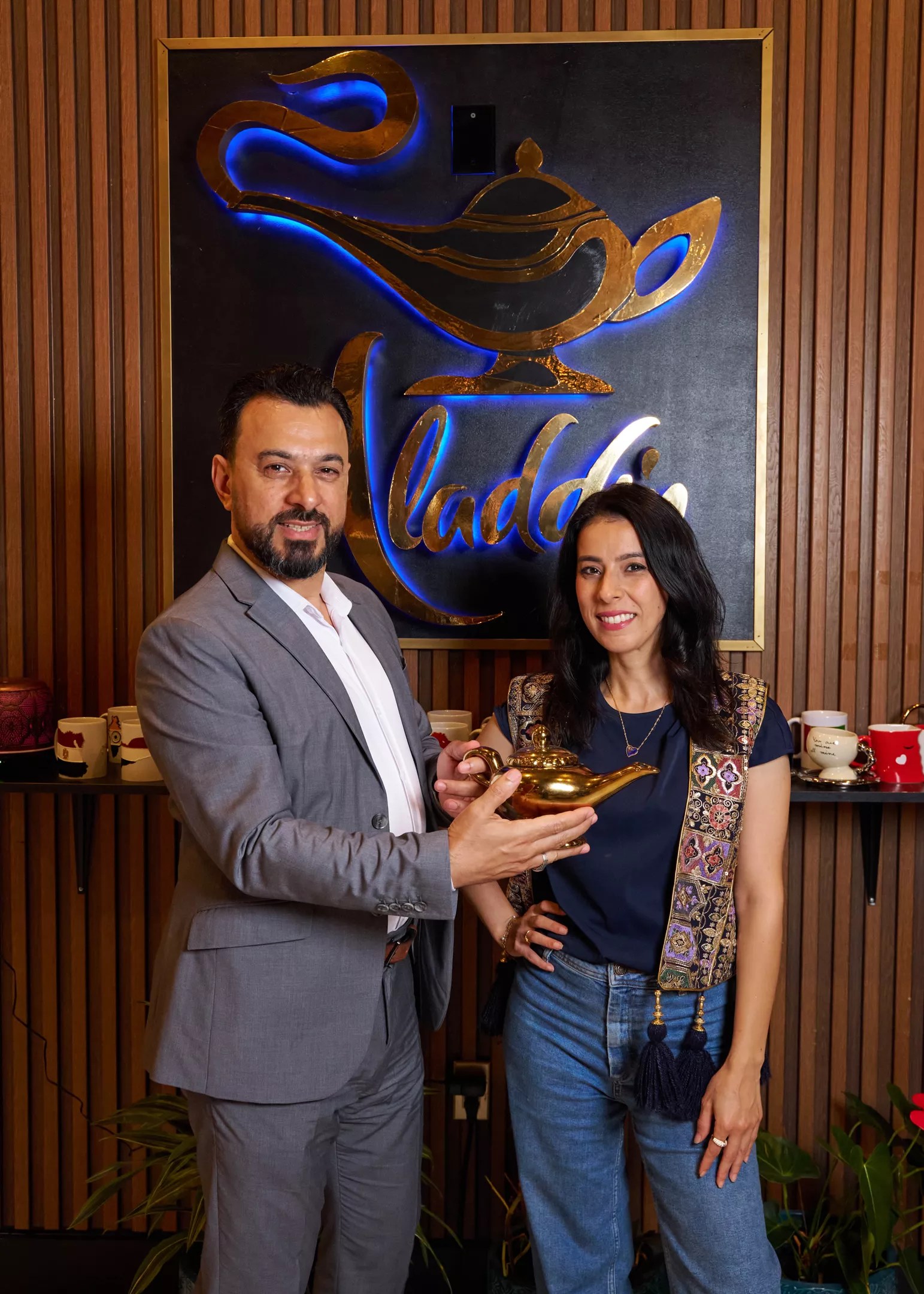
Mezr and Dalal Murad say their inspiration for Aladdin cafe comes from their family’s dedication to food and culture.
Alison McLean
Aladdin Cafe, operated by Mezr Murad along with his siblings, Dalal and Wisam, sits at the far end of the courtyard. Before anyone else, he operated a business in the Arabian Village, a small furniture store that has since closed.
“In the beginning, whenever someone parked here, we got happy,” Murad recalls with a laugh. “Now, at night, we can’t find parking.”
Immigrating from Iraq over 20 years ago, Murad built a career as a construction manager and civil engineer for hire. When he opened Aladdin Cafe in 2023, it was a chance to create his masterpiece, pulling from bits of inspiration collected across his life. It’s based on the actual Aladdin and Jasmine story, though more of the classic Arabian Nights version than the Disney adaptation. Murad recalls reading the book as a child in Iraq and borrowing it from a friend, as it was banned then.
“My concept is focusing on love,” he says. “The most love story in Arabian Nights is between Jasmine and Aladdin. I believe people are missing love. If we love each other, we live a perfect life.”
Inside the cafe, “nothing is random,” Murad says. The bronze tiles on the ceiling contain a subtle turquoise tint in the center, taken from the color of Jasmine’s dress in a mural painted on the back wall. The orange in Aladdin’s hat matches the orange domes in an era-specific diorama that hangs on the wall of what a traditional Iraqi house would’ve looked like in Aladdin’s time.
“Most people come here and ask me the questions,” Murad says. “‘Why did you choose Aladdin and Jasmine?’ ‘What’s the concept behind this?’ And I’m so proud to tell them.”
Hospitality goes a long way for Murad, too. He has Middle Eastern flag designs on cups and specialty Aladdin Cafe-branded mugs.
“Imagine you come to my house and I serve you tea in a to-go cup,” he says. “You will feel disappointed, right? Because I’m not considering you like a guest, I’m considering you as just somebody. But if you are my guest and I care about you, I will show you everything beautiful I have, like the teacup or coffee mug.”
The menu is sweeter, with alcohol-free mojitos made with Red Bull or soda water, several tea selections, and unconventional methods. Coffee on sand is the standout, a cup of Joe cooked slowly in a pot over a pile of hot sand.
These days at the Arabian Village, packed late nights are expected.
“Slowly but surely, and within eight months, it just changed the whole strip,” Hafeez says. “It’s unity. We have to support each other.”
The Arwa owners shared the same sentiment.
“I don’t see anyone as a competitor,” Soofi says. “It’s a community of flavor. When you come in the courtyard, it’s just so much energy.”
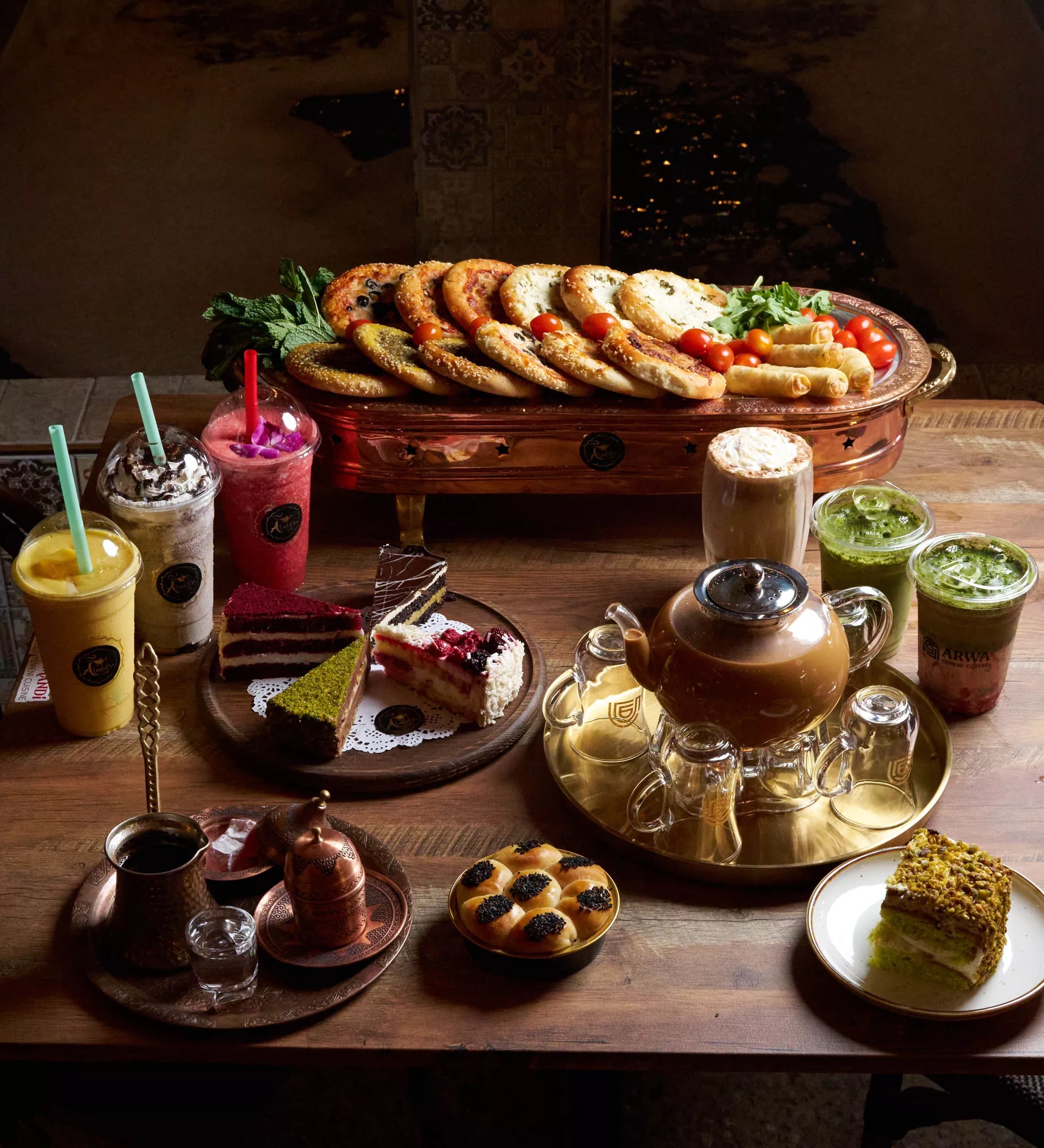
A mix of dishes from Arwa Yemeni Cafe (iced drinks, coffee, pistachio cake, and honeycomb bread) and Aladdin Cafe (smoothies, cake slices, coffee).
Alison McLean
“You could see at a single table, everyone having an Arwa cup, but one person has a dessert from Big Dash or a sandwich from One Bite,” Shihab says. “You really realize what the space has built for a community.”
In an American restaurant landscape defined by razor-sharp business decisions and aggressive strategies, these small businesses provide the radical alternative: peace, love and collaboration. You’ll feel a sense of warmth upon entering each of the restaurants, and once you’ve gone, you’ll crave it.
“The beauty of this place, the Arabian Village,” Alashwal says, “is that it gathers all these restaurants and creates this center. If you want anything Middle Eastern, you’re gonna come to this neighborhood. The best restaurants and the best cafes are going to be in this area, and we complement each other. It’s a great experience. You come here, it’s a one-stop shop.”